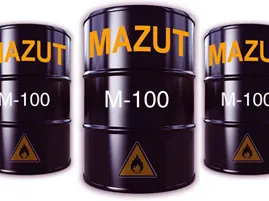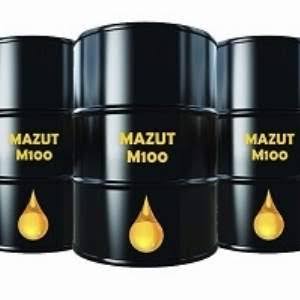Mazut
Mazut: Heavy Fuel Oil for Industrial Use
Mazut is a heavy, low-quality fuel oil derived from the distillation of crude oil. It is primarily used in large-scale industrial applications, particularly for power generation, heating, and heavy machinery operations. Mazut is a key energy source in countries where lighter fuel oils, such as diesel or natural gas, are less accessible or too expensive for large-scale use. It is classified as a residual oil and is widely used in power plants, marine vessels, and heavy industrial boilers.


What is Mazut?
Mazut is produced as a byproduct during the crude oil refining process. It is a thick, viscous fuel with a high sulfur content, making it suitable primarily for industrial applications rather than consumer use. Depending on the refining process and the source of the crude oil, Mazut can vary in quality, with different grades available based on the sulfur content and viscosity.
Mazut is particularly popular in Russia, Eastern Europe, and parts of Asia, where it is used extensively in energy production. Its heavy nature means it is cheaper than lighter fuels, which makes it attractive for large-scale users like power plants.
Types and Grades of Mazut
Mazut comes in several grades, primarily differentiated by their sulfur content and viscosity. The most common grades include:
Mazut M100: This is the most widely used grade of Mazut. It has a high sulfur content and is thick, making it ideal for industrial boilers and power generation. M100 is often further categorized into subtypes based on the sulfur content:
- Low sulfur: Sulfur content is less than 1%
- Normal sulfur: Sulfur content between 1% and 2%
- High sulfur: Sulfur content over 2%
Mazut M40: A lighter version of Mazut, M40 is less viscous than M100 and is often used in smaller industrial applications where a slightly higher grade of fuel is required.
Key Features of Mazut
High Energy Content: Mazut is a highly energy-dense fuel, making it effective for large-scale energy production in power plants and industrial operations. Its high calorific value ensures efficient power generation.
Cost-Effective: As a residual oil product, Mazut is significantly cheaper than lighter fuels like diesel or natural gas. This makes it an economically viable option for industries with high energy demands.
Industrial Applications: Mazut is designed for heavy-duty use. It is commonly used in power plants, factories, marine vessels, and large industrial boilers. It is especially popular in regions where natural gas and lighter fuels are either scarce or too expensive.
Challenging Handling and Storage: Mazut’s thick consistency makes it difficult to handle and requires special infrastructure for storage and transport. Heating systems are often used to reduce the viscosity during handling.
Applications of Mazut
Power Generation: Mazut is a key fuel for power plants, especially in countries with large heavy oil reserves or where coal and natural gas are less available. It is burned in industrial boilers to generate steam, which drives turbines to produce electricity.
Industrial Boilers: Many industries, particularly those that require high-temperature processes such as manufacturing or refining, rely on Mazut as a primary fuel source for their boilers. The fuel’s high energy density makes it a practical option for these energy-intensive processes.
Marine Vessels: Mazut is used as bunker fuel for large ships and marine vessels. Its cost-efficiency is attractive for long-distance shipping companies, particularly in areas where fuel regulations allow for the burning of high-sulfur fuels.
Heating Systems: In regions where access to natural gas is limited, Mazut is often used to power heating systems for large industrial complexes and residential buildings. Its availability and relatively low cost make it a popular option for central heating systems in some countries.
Benefits of Mazut
Affordability: Mazut is considerably less expensive than lighter fuels like diesel or kerosene. For industries with large-scale energy requirements, Mazut provides an economical solution for powering operations without incurring the high costs of premium fuels.
Abundant Supply: Mazut is readily available in many regions due to its production as a byproduct of crude oil refining. Countries with significant refining capabilities or oil reserves often have an ample supply of Mazut, reducing the need for imports.
Energy Density: Mazut has a high calorific value, meaning that it can generate substantial energy output per unit. This is beneficial for power generation, where efficiency and energy production are crucial.
Industrial-Scale Usability: The thick, viscous nature of Mazut is ideal for heavy industrial machinery and processes, particularly in power generation and large-scale manufacturing.
Challenges of Using Mazut
Environmental Impact: Mazut has a high sulfur content, making it a major contributor to air pollution when burned. Sulfur dioxide (SO₂) emissions are a concern for industries using Mazut, especially in regions with stringent environmental regulations.
Handling and Storage Requirements: Due to its viscosity, Mazut requires specialized handling systems. It needs to be heated during storage and transport to keep it in a liquid state for use, which adds to the operational costs and infrastructure requirements.
Fuel Regulations: Many countries are moving towards cleaner energy sources, and stricter fuel regulations are being implemented to curb the environmental impact of high-sulfur fuels like Mazut. Industries using Mazut may face restrictions or additional costs to meet emission standards.
Mazut Supply Chain
Mazut follows a global supply chain from production to end use. The process includes:
Refining and Production: Mazut is produced as a byproduct during the refining of crude oil. The heavy fractions are separated from the lighter products and undergo further treatment to remove impurities, although the sulfur content remains relatively high.
Storage and Handling: Special facilities are required to store Mazut, as it needs to be heated to maintain its fluidity. Large tanks equipped with heating coils are often used for bulk storage, particularly at refineries and power plants.
Transportation: Mazut is typically transported via pipelines, railcars, or tankers equipped with heating systems to prevent the fuel from solidifying. For long-distance transportation, heated marine tankers are used.
End-Use: Once delivered, Mazut is burned in boilers or engines to produce energy. In power plants, the heat generated by burning Mazut is used to convert water into steam, which drives turbines to produce electricity.
Why Choose Mazut?
Cost Savings: For industries with large energy demands, Mazut provides a cost-effective solution that can significantly reduce fuel expenses compared to premium fuels like natural gas or diesel.
Availability: In regions where Mazut is readily available, its abundance makes it a reliable energy source. Industrial facilities in these areas can benefit from the lower fuel costs and consistent supply.
High Energy Output: Mazut’s energy density makes it an efficient choice for heavy-duty industrial applications, particularly where continuous and reliable energy production is essential.
Contact Us for Mazut Supply
As a trusted supplier of Mazut, we offer high-quality fuel to meet the energy needs of power plants, industrial facilities, and marine vessels. Our logistics network ensures timely deliveries to keep your operations running smoothly. Contact us today for a customized quote and learn more about how we can support your fuel requirements.
Partner with us to secure a reliable supply of Mazut, ensuring efficient and cost-effective energy for your business.

